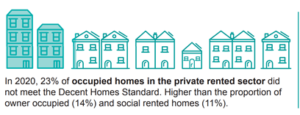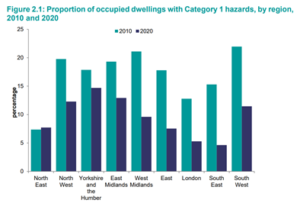Prime Minister Liz Truss today agreed to end no-fault evictions, bringing relief to some 11 million private renters across the United Kingdom.
When asked by Graham Stringer, MP for Blackley and Broughton, at Prime Minister’s Questions whether she would honour and carry out the 2019 manifesto commitment by her party, Liz Truss responded: “I can.”

In order to evict a tenant in England and Wales, a landlord must provide them with a Section 21 notice. Provided that a Court is satisfied, the notice then gives the tenant just 14 days to vacate the property, but this can be delayed to six weeks if it can be proven that a tenant will experience “exceptional hardship”.
Currently, the landlord does not need to provide a reason for the eviction notice to reclaim the property and the tenancy can only be ended through a court order enforced by a County Court bailiff or a High Court enforcement officer.
The impact of Section 21 notices can be devastating. Section 21 notices are the leading cause of homelessness in the UK with research from Shelter England estimates that since April 2019, a notice is handed out every seven minutes on average.

Shelter welcomes the Prime Minister’s commitment to ending Section 21 notices but believes that more must be done. Osama Bhutta, Director of Campaigns, said:
“The Prime Minister reassured parliament today that the government will scrap Section 21 no fault evictions and it won’t U-turn on its manifesto commitment. Truss’s words will provide some relief for England’s 11 million private renters who deserve better than this chaos.
“But the government promised to transform private renting, of which banning no-fault evictions is one part of the package. The Renters’ Reform Bill is ready to go, it’s time the government stopped stalling and brought the Bill forward in this parliament.
“Private renting is completely broken – anything less than wholesale reform won’t give private renters the security and stability they need. Now the government must also stay true to its word to ban discrimination against low-income families and ensure privately rented homes are decent and safe.”
Currently, the reforms would be of a great benefit to the North of England, with data from the English Housing Survey indicating that the majority of non-decent homes is higher in the North than any other region. A total of 3.5 million homes fell below the Decent Homes Standard, with 2.2 million being a Category 1 Hazard, almost one million having serious damp.

What is the Renters Reform Bill?
The Bill aims to extend the Decent Homes Standard to the private sector for the first time, allowing renters access to high-quality homes, “levelling up” the 21% of private renters living in unacceptable homes.
Section 21 notices will be banned, thus allowing private renters the chance to remain in a community. 22% of renters (July 2021-July 2022) did not move homes by choice and this may save families £1400 in moving costs.
The reforms will prevent landlords from allowing renters to live in low-quality homes, which is forecast to save almost £3.5 billion in taxpayer money that goes to these landlords and in NHS costs estimated to be due to injuries sustained in poor conditions.
A Private Renters’ Ombudsman will be created in order to swiftly settle disputes between tenants and landlords at low-cost. The Ombudsman will cover all private landlord letting properties and will ensure that landlords take measures to improve low-quality homes.
Finally, the Bill will create a property portal in order to help both tenants and local councils hold underperforming landlords to accountability and to remind landlords of their obligations.

Initially set to be introduced by Michael Gove and the Department of Levelling Up, Housing and Communities in July 2022, the Bill was said to be the “biggest change to renters’ law in a generation” by the department.
However due to the political instability caused by Boris Johnson’s resignation as PM, and the subsequent leadership contest and new government, the Bill has currently not been introduced.
The Renters’ Reform Coalition held a demonstration in London on October 12th, echoed Shelter’s call for the Renters Reform Bill to be ratified and enacted:
“Commitment to end Section 21 is welcome news, but we have more questions. When and how? What about the Renters’ Reform Bill that was promised this Autumn?”

Featured image courtesy of YouGov









